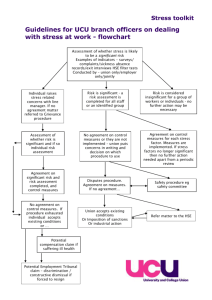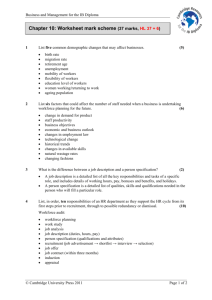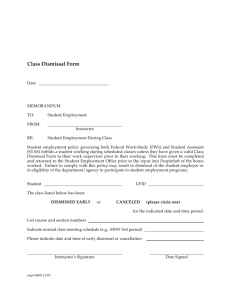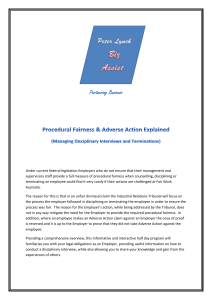Statute C Schedule - the University Offices
advertisement
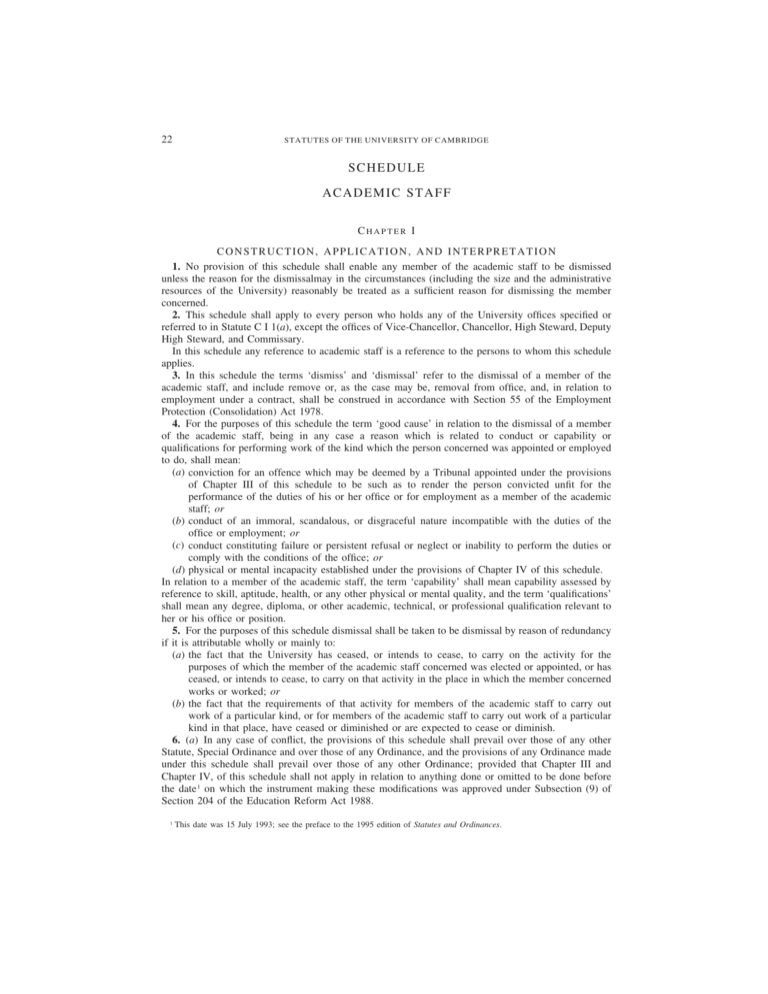
22 STATUTES OF THE UNIVERSITY OF CAMBRIDGE SCHEDULE ACADEMIC STAFF CHAPTER I CONSTRUCTION, APPLICATION, AND INTERPRETATION 1. No provision of this schedule shall enable any member of the academic staff to be dismissed unless the reason for the dismissalmay in the circumstances (including the size and the administrative resources of the University) reasonably be treated as a sufficient reason for dismissing the member concerned. 2. This schedule shall apply to every person who holds any of the University offices specified or referred to in Statute C I 1(a), except the offices of Vice-Chancellor, Chancellor, High Steward, Deputy High Steward, and Commissary. In this schedule any reference to academic staff is a reference to the persons to whom this schedule applies. 3. In this schedule the terms ‘dismiss’ and ‘dismissal’ refer to the dismissal of a member of the academic staff, and include remove or, as the case may be, removal from office, and, in relation to employment under a contract, shall be construed in accordance with Section 55 of the Employment Protection (Consolidation) Act 1978. 4. For the purposes of this schedule the term ‘good cause’ in relation to the dismissal of a member of the academic staff, being in any case a reason which is related to conduct or capability or qualifications for performing work of the kind which the person concerned was appointed or employed to do, shall mean: (a) conviction for an offence which may be deemed by a Tribunal appointed under the provisions of Chapter III of this schedule to be such as to render the person convicted unfit for the performance of the duties of his or her office or for employment as a member of the academic staff; or (b) conduct of an immoral, scandalous, or disgraceful nature incompatible with the duties of the office or employment; or (c) conduct constituting failure or persistent refusal or neglect or inability to perform the duties or comply with the conditions of the office; or (d) physical or mental incapacity established under the provisions of Chapter IV of this schedule. In relation to a member of the academic staff, the term ‘capability’ shall mean capability assessed by reference to skill, aptitude, health, or any other physical or mental quality, and the term ‘qualifications’ shall mean any degree, diploma, or other academic, technical, or professional qualification relevant to her or his office or position. 5. For the purposes of this schedule dismissal shall be taken to be dismissal by reason of redundancy if it is attributable wholly or mainly to: (a) the fact that the University has ceased, or intends to cease, to carry on the activity for the purposes of which the member of the academic staff concerned was elected or appointed, or has ceased, or intends to cease, to carry on that activity in the place in which the member concerned works or worked; or (b) the fact that the requirements of that activity for members of the academic staff to carry out work of a particular kind, or for members of the academic staff to carry out work of a particular kind in that place, have ceased or diminished or are expected to cease or diminish. 6. (a) In any case of conflict, the provisions of this schedule shall prevail over those of any other Statute, Special Ordinance and over those of any Ordinance, and the provisions of any Ordinance made under this schedule shall prevail over those of any other Ordinance; provided that Chapter III and Chapter IV, of this schedule shall not apply in relation to anything done or omitted to be done before the date 1 on which the instrument making these modifications was approved under Subsection (9) of Section 204 of the Education Reform Act 1988. 1 This date was 15 July 1993; see the preface to the 1995 edition of Statutes and Ordinances. SCHEDULE TO STATUTE C 23 (b) Nothing in any appointment made, or contract entered into, shall be construed as overriding or excluding any provision made by this schedule concerning the dismissal of a member of the academic staff by reason of redundancy or for good cause; provided that nothing in this subsection shall invalidate any waiver made under Section 142 of the Employment Protection (Consolidation) Act 1978. (c) No one shall sit as a member of any of the bodies established under this schedule, and no one shall be present at a meeting of such a body when the body is considering its decision or discussing a point of procedure, except as provided by this schedule or by Ordinances made under this schedule. (d) The provisions of Section 2 of Special Ordinance D (iii) shall apply to any notice required by this schedule, or by Ordinance made thereunder, and the provisions of Statute D II 6 and 22 and Sections 1, 3 and 4 of Special Ordinance D (iii) shall apply to any proceedings before the University Tribunal or the Septemviri. (e) In this schedule references to numbered chapters, sections, and subsections are references to chapters, sections, and subsections so numbered in this schedule. CHAPTER II REDUNDANCY 1. This chapter enables the appropriate body to dismiss any member of the academic staff by reason of redundancy. For the purposes of this chapter the appropriate body shall be either the Council or the General Board, as the case may be, acting in its capacity as the competent authority. 2. Nothing in this chapter shall prejudice, alter, or affect any rights, powers, or duties of the University or apply in relation to a person unless (a) her or his appointment was made, or contract of employment was entered into, on or after 20 November 1987; or (b) he or she was promoted on or after that date. 3. For the purposes of Section 2 above in relation to a person, a reference to an appointment made or a contract entered into on or after 20 November 1987 or to promotion on or after that date shall be construed in accordance with subsections (3) to (6) of Section 204 of the Education Reform Act 1988. 4. The Regent House shall have power to decide: either (a) on the recommendation of the Council, that there should be a reduction in the academic staff of the University as a whole; or (b) on the recommendation of the competent authority concerned, that there should be a reduction in the academic staff of any School, Faculty, Department, or other institution, by way of redundancy. Neither the Council nor the competent authority may delegate the power to make recommendations pursuant to this section. 5. Where the Regent House has reached a decision under Section 4 the competent authority concerned shall appoint a Redundancy Committee to be constituted in accordance with Section 6 below, whose duties shall be: (a) to select the requisite members of the academic staff and recommend them for dismissal by reason of redundancy; (b) to report its recommendations to the competent authority by such date as the latter may specify. 6. A Redundancy Committee shall comprise: (a) a Chair; (b) two members of the Council; (c) two members of the General Board, not being members of the Council. 7. The competent authority shall either approve any selection recommended under Section 5 above or remit it to the Redundancy Committee for further consideration in accordance with any further directions that the competent authority may give. A selection shall not be approved under this section unless the member of the academic staff concerned has been afforded a reasonable opportunity to make representations to the competent authority. 8. If the competent authority has approved a selection recommended by the Redundancy Committee, it shall publish the recommendation in a Report to the University. No member of the academic staff shall be dismissed by reason of redundancy except after the approval by Grace of the recommendations of such a Report. 24 STATUTES OF THE UNIVERSITY OF CAMBRIDGE 9. If, following a Report of the competent authority, a recommendation for the dismissal of a member of the academic staff has been approved by Grace, the competent authority may direct an appropriate officer as its delegate to dismiss the member concerned. 10. Each member of the academic staff selected for dismissal shall be given separate notice of such selection. The notice shall sufficiently identify the circumstances which have satisfied the competent authority that the intended dismissal is reasonable, and in particular shall include: (a) a summary of the action taken by the competent authority under the provisions of this chapter; (b) an account of the selection procedure used by the Redundancy Committee; (c) a reference to the rights of the person notified to appeal against the notice and to the time within which any such appeal is to be instituted under Special Ordinance; 1 (d) a statement indicating when the intended dismissal is to take effect. CHAPTER III DISCIPLINE, DISMISSAL, AND REMOVAL FROM OFFICE 1. For the purpose of any disciplinary procedures under Sections 2–4 below the responsible person in relation to any particular member of the academic staff shall be the Head of the appropriate Department or other institution, or the Chair of the Board, Syndicate, or other body which is chiefly concerned with the member’s duties. 2. If it appears to the responsible person that there are grounds for believing that the conduct or performance of a member of the academic staff is or has been unsatisfactory, he or she shall inquire into the matter. If the responsible person concludes after investigation that the member is at fault, he or she may issue an oral warning to the member. The responsible person shall specify the reason for the warning, shall indicate that it constitutes the first stage of the University’s disciplinary procedure, and shall advise the member that he or she may appeal against the warning by following the procedure laid down in pursuant to Chapter VI for the redress of a grievance. 3. If the responsible person concludes after investigation that the fault is sufficiently serious to justify it, or if a further offence occurs, he or she may issue a written warning to the member. Such a warning shall specify the complaint made against the member, the improvements required in the member’s conduct or performance, and the period of time within which such improvements are to be made. The responsible person shall advise the member that he or she may appeal against the warning by following the procedure laid down in pursuant to Chapter VI for the redress of a grievance, and shall indicate that, if no satisfactory improvement takes place within the stated time, a complaint may be made to the Vice-Chancellor under Section 5 below. 4. The responsible person shall keep a written record of any warning issued under Section 2 or Section 3 above. No further account shall be taken of an oral warning when one year has elapsed after the date of its issue, and no further account shall be taken of a written warning when two years have elapsed after the date of its issue. 5. If a complaint is made to the Vice-Chancellor concerning the conduct or performance of a member of the academic staff, and if it appears to the Vice-Chancellor that there are grounds for believing that the conduct or performance to which the complaint relates could constitute good cause for dismissal, the Vice-Chancellor shall institute such investigations or inquiries (if any) as appear to her or him to be necessary. 6. If in a particular case it appears to the Vice-Chancellor that a complaint concerning a member of the academic staff is trivial or unjustified, or that it relates to an alleged infringement of Statutes or Ordinances, or of rules made under any Ordinance, for which a standard penalty is normally imposed in the University or within the School, Faculty, Department, or other institution, the Vice-Chancellor may dismiss the complaint summarily, or decide not to proceed further under this chapter. 7. In the case of a complaint not disposed of under Section 6 above, the Vice-Chancellor shall treat the complaint as disclosing a sufficient reason for proceeding further under this chapter and shall write to the member of the academic staff concerned inviting comment in writing. The Vice-Chancellor shall have discretion: (a) to suspend the member without loss of stipend, and 1 See Special Ordinance C (xiii), p. 95. SCHEDULE TO STATUTE C 25 (b) to exclude the member from all University premises or any part thereof, pending a final decision. 8. As soon as may be following the receipt of any comments, or after twenty-eight days if no comment is received within that period, the Vice-Chancellor shall consider the matter in the light of all the evidence then available. If no comment is received within twenty-eight days, the Vice-Chancellor may proceed as if the member of the academic staff had denied the complaint in its entirety. The ViceChancellor may: (a) dismiss the matter; or (b) refer the matter for consideration under Sections 2 and 3 of this chapter or under Statute D II 2; or (c) deal with it informally if it appears to the Vice-Chancellor appropriate to do so and if the member of the academic staff agrees in writing that the matter should be dealt with in that way; or (d) direct the University Advocate to prefer a charge or charges to be considered by the University Tribunal. 9. If the Vice-Chancellor has directed the University Advocate to prefer a charge or charges, the Clerk of the Tribunal shall notify the member concerned of the date, time, and place to attend the Tribunal, and of the charge or charges, and shall send the member any documents specified therein. The University Advocate shall present the charge or charges to the Tribunal, shall make any necessary administrative arrangements for the summoning of witnesses and the production of documents, and shall be generally responsible for the proper presentation of the case to the Tribunal. 10. The procedure to be followed in respect of the preparation, hearing, and determination of charges by the Tribunal shall be prescribed by Ordinances made under this section. 11. Without prejudice to the generality of the foregoing, such Ordinances shall ensure: (a) that the member of the academic staff concerned is entitled to be represented by another person, whether such person is legally qualified or not, in connection with and at any hearing by the Tribunal; (b) that a charge shall not be determined without an oral hearing at which the member concerned and any person appointed by the member to represent him or her are entitled to be present; (c) that witnesses may be called, both on behalf of the member and by the University Advocate, and that such witnesses may be questioned concerning any relevant evidence; (d) that full and sufficient provision is made for postponements, adjournments, dismissal of the charge or charges for want of prosecution, remission of the charge or charges to the ViceChancellor for further consideration, and for the correction of accidental errors; (e) that appropriate time limits are set for each stage of the proceedings (including the hearing) to the intent that the charge shall be heard and determined by the Tribunal as expeditiously as is reasonably practicable. 12. If the charge or charges are upheld, the Tribunal shall determine the appropriate penalty (if any), which may be: (a) if the Tribunal finds that the conduct or performance of the member of the academic staff concerned constitutes good cause for dismissal, the removal of the member from office; or (b) such lesser penalty under the member’s contract of employment or terms of appointment, including any penalty specified in Statute D II 3, as appears to the Tribunal fair and reasonable in all the circumstances of the case. If the Tribunal determines that dismissal is the appropriate penalty, the Chair of the Tribunal shall have power to impose that penalty. If the Chair does not impose the penalty of dismissal, or if the Tribunal has determined that some lesser penalty is appropriate, the Tribunal may impose a sentence in accordance with the provisions of Statute D II 3. 13. The Clerk of the Tribunal shall notify the Vice-Chancellor, the University Advocate, and the member concerned of the Tribunal’s decision on any charge referred to it. Such notification shall include the Tribunal’s findings of fact regarding the charge, the reasons for its decision, the penalty (if any) determined by the Tribunal, and the penalty (if any) imposed by the Tribunal or the Chair. The Clerk of the Tribunal shall draw attention to the period of time within which any appeal should be instituted by ensuring that a copy of the procedure for appeal under Special Ordinance 1 is sent to the member concerned. 1 See Special Ordinance C (xiii), p. 95. 26 STATUTES OF THE UNIVERSITY OF CAMBRIDGE CHAPTER IV REMOVAL FOR INCAPACITY ON MEDICAL GROUNDS 1. This chapter makes separate provision for the dismissal or removal from office of a member of the academic staff by reason of incapacity on medical grounds. 2. In this chapter (a) references to medical grounds are references to capability assessed by reference to health or any other physical or mental quality; (b) references to the appropriate officer are references to the Vice-Chancellor or an officer acting as the Vice-Chancellor’s delegate; (c) references to a member of the academic staff include, in cases where the nature of the alleged disability so requires, a responsible relative or friend or other person having authority to act on behalf of that member in addition to (or instead of) the member. 3. If it appears to the competent authority that the removal from office of a member of the academic staff on medical grounds should be considered, the secretary of the competent authority (a) shall inform the member accordingly, giving notice of the reasons; (b) shall notify the member in writing that it is proposed to make an application to the member’s medical practitioner for a medical report and shall seek the member’s consent in writing in accordance with the requirements of the Access to Medical Reports Act 1988; (c) may suspend the member from the performance of her or his duties without loss of stipend. 4. If in the light of any medical report obtained under Section 3 above the competent authority is satisfied that a member of the academic staff should be required to retire on medical grounds, and if the member accepts the opinion of the competent authority, the appropriate officer shall terminate the member’s employment on those grounds. 5. If the member does not agree that her or his removal from office on medical grounds should be considered, or if after a medical report has been obtained the member declines to retire on medical grounds, the competent authority may refer the case in confidence, with all relevant medical and other evidence (including any such evidence submitted by the member), to a Medical Board comprising: (a) a medically qualified chair appointed by the Council with the agreement of the member concerned or, in default of such agreement, on the nomination of the President of the Royal College of Physicians of London; (b) one person appointed by the competent authority; (c) one person appointed by the member concerned or, in default of such appointment, a second person appointed by the competent authority. 6. The procedure to be followed in respect of the preparation, hearing, and determination of a case by a Medical Board shall be prescribed by Ordinances made under this section. Such Ordinances shall ensure: (a) that the member concerned is entitled to be represented by another person, whether such person is legally qualified or not, in connection with and at any hearing by the Board; (b) that a case shall not be determined without an oral hearing at which the member concerned is entitled to be represented; (c) that witnesses may be called and may be questioned concerning any relevant evidence; (d) that the case is heard and determined as expeditiously as is reasonably practicable. The Board may require the member concerned to undergo medical examination. 7. The University shall meet the reasonable costs of any medical report or medical examination required under Section 3 or Section 6 above. 8. If a Medical Board determines that a member’s removal from office would be justified on medical grounds, the appropriate officer may terminate the employment of the member on those grounds. SCHEDULE TO STATUTE C 27 CHAPTER V APPEALS Repealed by Grace 2 of 10 June 2015 CHAPTER VI GRIEVANCE 1. Every University officer has a right to raise any concerns, problems, or complaints relating to her or his appointment or employment, not being matters for which express provision is made elsewhere in Statutes and Ordinances. 2. The University shall establish by Special Ordinance, and may vary from time to time, procedures for the redress of any grievance by a University officer concerning his or her appointment or employment.

